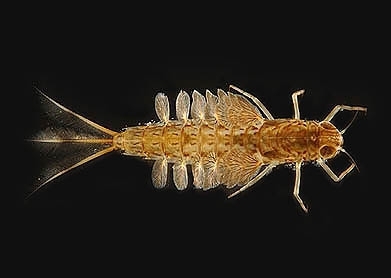Macroinvertebrate Sampling
Macroinvertebrates like this Mayfly nymph are sensitive to pollution: their presence in a stream is an indication of good water quality.

The purpose of the macroinvertebrate sampling pilot program is to provide an assessment of the aquatic health of macroinvertebrate populations within Cambridge source water supply tributaries. This project may in the future serve as a volunteer opportunity to connect Cambridge residents to the Cambridge Watershed and may also serve as the basis for the framework of a long-term macroinvertebrate study.
Macroinvertebrates are small aquatic animals that have no backbone and can be seen by the naked eye. The health of macroinvertebrate populations provides a more complete assessment of long-term water quality due to their relatively long lifespan (depending on species) and difficulty relocating within water bodies. Whereas water chemistry samples provide snapshots of the instantaneous conditions within a water body, the presence or lack of certain macroinvertebrates indicates long term trends of water quality and the impacts of these water quality conditions.
The information gathered on the macroinvertebrate populations can:
- Identify tributaries in need of more attention
- Establish a baseline for future studies
- Assess current stormwater and land-use pattern impacts on aquatic health.
In 2019, CWD performed macroinvertebrate sampling in four tributary reaches. The results are summarized in the 2019 Benthic Macroinvertebrate Report.